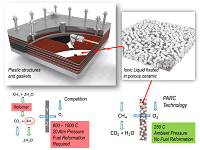Reformer-less Fuel Cell

Technology Description:
Palo Alto Research Center (PARC) is developing an intermediate-temperature fuel cell that is capable of utilizing a wide variety of carbon-based input fuels such as methane, butane, propane, or coal without reformation. Current fuel cell technologies require the use of a reformer – which turns hydrocarbon fuels into hydrogen and can generate heat and produce gases. PARC’s design will include a novel electrolyte membrane system that doesn’t have a methane-to-hydrogen reformer, and transports oxygen in a form that allows it to react directly with almost any fuel. This new membrane system eliminates the need for a separate fuel processing system all while reducing overall costs. PARC’s fuel cell will also operate at relatively low temperatures of 200-300ºC which allows it to use less expensive materials and maintain durability. With the use of these materials, the fuel cell system avoids the long-term durability problems associated with existing higher-temperature fuel cells, all while reducing overall costs.
Potential Impact:
If successful, PARC’s reformer-less fuel cell will utilize a wide-range of low-cost, domestic fuels more efficiently and can be made from less expensive materials.
Security:
Enabling more efficient use of natural gas for power generation provides a reliable alternative to other fuel sources—a broader fuel portfolio means more energy security.
Environment:
Natural gas produces roughly half the carbon dioxide emissions of coal, making it an environmentally friendly alternative to existing sources of power generation.
Economy:
Distributed generation technologies would reduce costs associated with power losses compared to centralized power stations and provide lower operating costs due to peak shaving.
Contact
ARPA-E Program Director:
Dr. Paul Albertus
Project Contact:
Dr. Ashish Pattekar
Press and General Inquiries Email:
ARPA-E-Comms@hq.doe.gov
Project Contact Email:
pattekar@parc.com
Related Projects
Release Date:
11/25/2013
